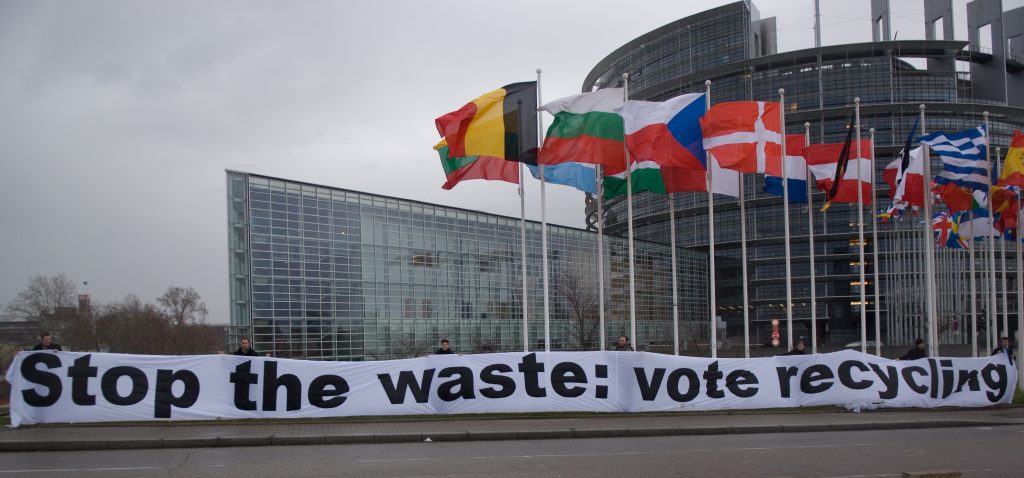On Tuesday 13th/Wednesday 14th February, the European Parliament will vote in Strasbourg on the revision of the Waste Framework Directive. This directive is the umbrella law for all EU waste legislation. Positive improvements to the directive to boost recycling and waste prevention could hugely improve Europe’s resource efficiency and cut greenhouse gas emissions.
Michael Warhurst, Waste and Resources Campaigner at Friends of the Earth Europe said: “With their vote, MEPs have a key opportunity to spur increased recycling across the EU, which – unlike incineration – would minimise greenhouse gas emissions and make efficient use of resources. We should be aiming to burn or bury nothing that could be re-used, recycled or composted.”
BACKGROUND
When the European Commission released its proposal in 2005, it claimed that its revisions to the Waste Framework Directive were intended to prevent waste and move Europe towards being a ‘recycling society’. But the proposals did little concrete to increase recycling and left it up to member states to produce waste prevention plans with no minimum objectives. The Commission also suggested only a three-step waste hierarchy, with re-use, recycling and recovery all given the same priority. Furthermore, the Commission promoted incineration by rebranding it as recovery rather than disposal, which gives it a higher status in the waste hierarchy and even gives incineration the same priority as recycling.
The Environment Committee improved on the European Commission’s proposal in November 2006, by expanding the three-step hierarchy to a five-step hierarchy, with clear differentiation between prevention, reuse, recycling, other recovery and disposal. The Environment Committee also voted to set an EU target for waste prevention – that the waste produced by the EU should be stabilised in the short-term (by 2012) and reductions targets set for 2020. In addition, Environment Committee MEPs voted to delete the formula that the European Commission had proposed which would rebrand incineration as ‘recovery’. Amendments to boost recycling were narrowly defeated in the Environment Committee.
FoE and EEB demands at the plenary vote:
Substantive measures to increase recycling: in particular an EU-wide recycling target of 50% of municipal waste and 70% of other waste by 2020 and a phase-out, of the incineration or landfill of any waste that can be reused, recycled or composted;A minimum EU objective for waste prevention, that waste production should stabilise short-term, by 2012, plus reduction targets for 2020, plus EU action to support National Governments in making best use of prevention programmes;A binding five step waste hierarchy, with waste prevention favoured, followed by reuse, recycling, other recovery and then disposal in descending order of priority;A requirement for municipal waste incinerators to be as efficient as possible, but waste incinerators should remain as disposal operations and not be reclassified as recovery;Further legislative work on individual material or waste streams – in particular a directive on recycling biowaste
Why recycling should be promoted over incineration:
RESOURCE EFFICIENCY: Incineration wastes valuable resources such as metals, plastics, wood or biodegradable resources that could otherwise be salvaged through recycling. Every ton of incinerated materials has to be extracted and processed again, increasing environmental damage and dependency of the EU economy on expensive imports. More energy is saved through recycling than is extracted by burning most wastes.
CLIMATE CHANGE: Incineration produces greenhouse gas emissions – a typical incinerator converting waste to electricity produces around 33% more fossil-fuel derived carbon dioxide than a gas fired power station [1]. In contrast, recycling saves greenhouse emissions by avoiding the need to extract and process primary resources. A recent UK government-funded study concludes that “UK recycling currently saves between 10-15 million tonnes of carbon dioxide equivalent greenhouse gases per year compared to other waste management options.”[2]
HIGH RECYCLING RATES ARE POSSIBLE: Belgium and Austria are already recycling more than 50% of their municipal waste, while a number of member states still recycle less than 10%. This shows the need to set high EU-wide recycling targets, so that the poor performers catch up.
JOBS: Recycling creates jobs. Recycling 10 000 tonnes of waste creates up to 250 jobs compared with 20 to 40 jobs needed if the waste is incinerated and about 10 for landfill. [3]
INCINERATION AS A BARRIER: The existence of incinerators discourages waste prevention and recycling – as incinerators are inflexible in terms of the quantities needed to operate them, authorities or waste companies are then under pressure to keep filling them with rubbish for years into the future to make sure they operate properly and get they their money back from building them in the first place.
WASTE TRANSPORT: Reclassification of incinerators as ‘recovery’ could promote export of waste from countries with strict, costly facilities like Germany to those with cheaper ones, like France, Poland and the Czech Republic. This unacceptable transport of waste will also result in an increase in greenhouse gas emissions.
SOUND USE OF EU FUNDS: In central and eastern Europe, the reclassification of incinerators could have particularly adverse effects. It could divert the use of millions of Euros from the EU structural and cohesion funds from sorting and recycling schemes into building new incinerators.
***
NOTES
[1] http://www.foe.co.uk/resource/briefings/dirty_truths.pdf
[2] http://www.wrap.org.uk/wrap_corporate/about_wrap/environmental.html
[3] http://ec.europa.eu/governance/impact/docs/ia_2005/com_2005_0666_en.pdf
Further information:
This media advisory is also available as a PDF: FoEE+EEB_Waste_Media_Advisory[1].pdf (38.21 KB)
Stopping the Waste policy briefing: http://www.foe.co.uk/resource/briefings/stopping_the_waste.pdf
EEB – http://www.eeb.org/activities/waste





